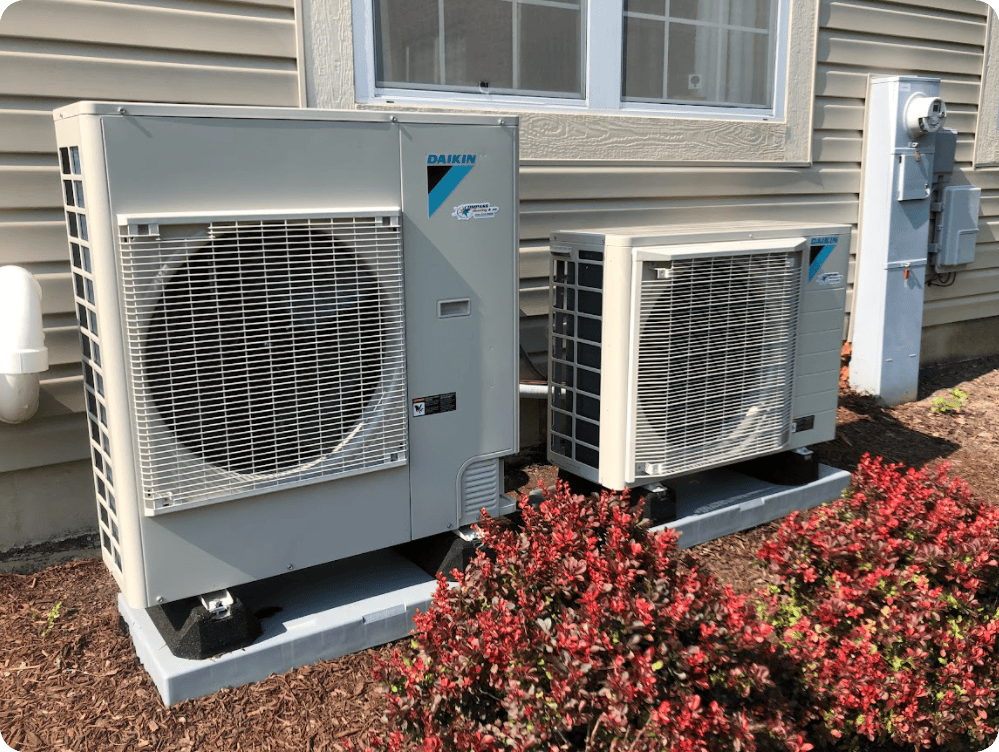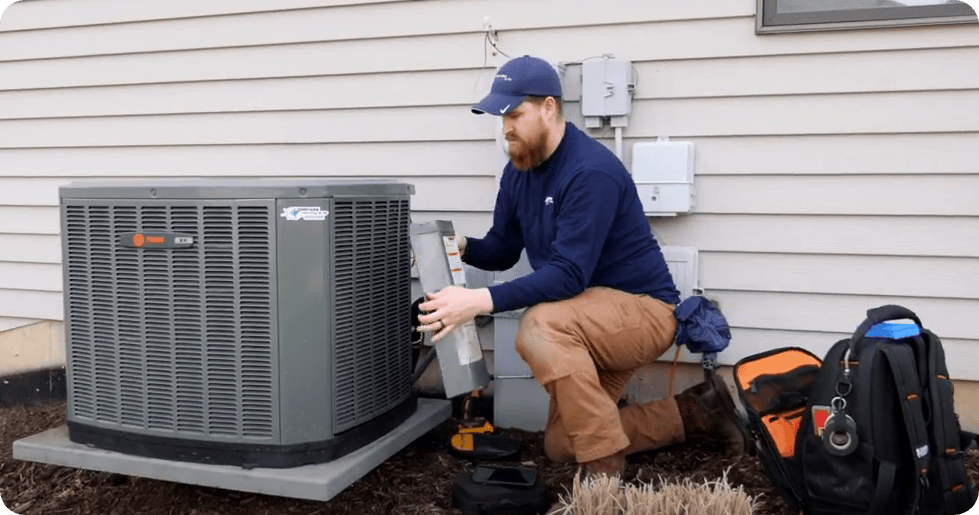CLICK TO LEARN MORE ABOUT IRA REBATES AND TAX CREDITS
Here’s Why You Should Replace Your AC With A Heat Pump
 When you’re getting ready to replace your traditional Air Conditioning system, it’s a good time to consider whether a heat pump can keep you comfortable and save you money. Between increased efficiency and new tax incentives, heat pumps can save you money both on installation and every month on energy bills as well.
When you’re getting ready to replace your traditional Air Conditioning system, it’s a good time to consider whether a heat pump can keep you comfortable and save you money. Between increased efficiency and new tax incentives, heat pumps can save you money both on installation and every month on energy bills as well.
At Compass Heating & Air Conditioning, Homeowners often ask us about whether they should consider replacing their traditional AC system with a heat pump. We have extensive experience working with homeowners in Downer’s Grove, IL, and surrounding areas. Our highly trained technicians specialize in providing top-notch heating and cooling solutions for residential and commercial customers. Our technicians have years of experience and are highly skilled in all aspects of HVAC maintenance, repair, and installation.
That’s why when we were asked whether you should consider replacing a traditional AC system with a heat pump, here’s what we think you should know:
What is a Heat Pump?
An air-sourced heat pump is a heating and cooling system that uses ambient air to heat and cool your home. These systems extract heat from your home and move it outside to cool your home or reverse the process to warm your home- and do so using less energy than conventional home heating and cooling systems.
Read More: How Are Heat Pumps Different From Air Conditioners?
How a Heat Pump Works
A heat pump works by using electricity to move heat from one place to another. It can work as a heater, or as an air conditioner depending on the weather and time of year.
In heating mode, it extracts warmth from the outside air and brings it inside. A reversing valve allows the heat pump to switch between cooling and heating modes. In this mode, it removes warm air from your home, cooling your home during the summer. Because heat pumps require less power to generate heat, and are up to 30% more efficient in cooling, this results in serious energy savings.
Types of Heat Pumps
Air-Source
Air-source heat pumps are the most common type, using the air outside to transfer heat. These can be part of a system using the air ducts in your home, or as a split system, sometimes called a mini split. With a mini split, one outdoor unit can power several indoor units, without the use of ductwork. This allows you to create separate zones of heating and cooling wherever you need it most.
Geothermal
Geothermal heat pumps use the stable temperature of the ground to heat and cool your home, providing even greater energy efficiency. These systems are often very expensive to install, but less expensive to operate.
Water-Source
Water-source heat pumps use a water source, such as a pond or well, to transfer heat, making them suitable for homes where access to a pond, lake, or well is nearby.
Replacing Central Air With a Heat Pump: Pros & Cons
 Pros
Pros
Better Comfort
Heat pumps are known for providing better comfort due to their ability to maintain consistent temperatures and humidity levels. In contrast, conventional air conditioners often are all on or off, leading to fluctuating temperatures and uneven cooling throughout the different parts of your home or business.
Lower Energy Bills
Heat pumps offer energy savings and lower energy bills compared to central air systems. According to the US Department of Energy, switching to a heat pump can save you up to 50% on your heating bills and up to 30% on your cooling bills, which can end up saving you a lot of money over the course of a year, especially here in Illinois!
Heating and Cooling
One of the most significant advantages of a heat pump is that it provides both heating and cooling. This makes it a versatile option for homeowners who want to replace their gas furnace or other fossil fuel-based heating systems. Air-sourced heat pumps and mini-split systems can create separate zones of comfort, which is important when you want a different level of comfort in a bedroom, compared to a kitchen or home office.
This also makes it a more attractive option to replace an ac unit with a heat pump. Instead of needing two separate heating and cooling solutions, you can have one that serves both purposes.
Clean Energy
By using electricity instead of natural gas, heat pumps contribute to carbon-free buildings and reduced greenhouse gas emissions. This is a big reason the switch to electricity was such a focus in the new Inflation Reduction Act.
Cons
Higher Installation Cost
While heat pumps can save money on energy bills, they may have a higher installation cost compared to traditional central air systems. However, the long-term energy savings often offset this initial expense.
In addition, new Federal Tax rebates are available which can make a significant difference when you are adding a new high-efficiency heat pump system to your home.
Unused Ductwork with a Mini Split
If you install a heat pump without using your existing ductwork, you may have unused ducts in your home. This can be a downside for homeowners who prefer a more streamlined appearance and don’t want to have an indoor unit on their walls.
However, heat pump systems can be designed to use your existing ductwork, so be sure to discuss that with your HVAC technician.
Cost to Run A Heat Pump Vs. Central Air
Although the installation cost of a heat pump can be higher, the cost to run the system is typically up to 30% lower than central air. The energy efficiency of heat pumps results in lower energy bills every month, providing long-term savings for homeowners.
Federal Incentives For A Heat Pump
The U.S. Department of Energy (DOE) and the Internal Revenue Service (IRS) are now offering federal tax credits for homeowners who install energy-efficient HVAC equipment. The Inflation Reduction Act includes provisions for these incentives, making it a win-win- you can save money with substantial tax rebates, while also gaining savings on your monthly energy bills.
Read More: Tax Credits And Rebates On High-Efficiency HVAC Equipment
FAQs
Can I add a heat pump to my existing system?
You can add a heat pump to your existing system- they can be set up to use your existing ductwork, or as stand alone systems, and can be set up to work as a mild weather solution, adding comfort while using less energy that the traditional system.
Do you still need a furnace with a heat pump?
Most heat pumps systems work well until the outdoor temperature drops to -20F, and then they can struggle to keep up. In areas that experience extreme cold in the winter, a backup furnace can be a good idea. However, here in Downer’s Grove and surrounding areas, our coldest winter days are about -2F, and never for long periods.
Can a heat pump heat a whole house?
Heat pump systems can heat your whole house, or you can set up mini-split systems to heat and cool portions of your home where you need comfort most, like sunrooms, bonus rooms and basements.
Give us a Call at Compass Heating and Air Conditioning to Learn More
If you are interested in learning more about heat pumps and whether you should consider replacing youe existing AC system with a heat pump this season, give us a call here at Compass Heating and Air Conditioning. Our experienced staff can help you determine what system will best serve your needs, and deliver the comfort you crave, with top-rated heat pump installation in Downer’s Grove, IL and surrounding areas.

